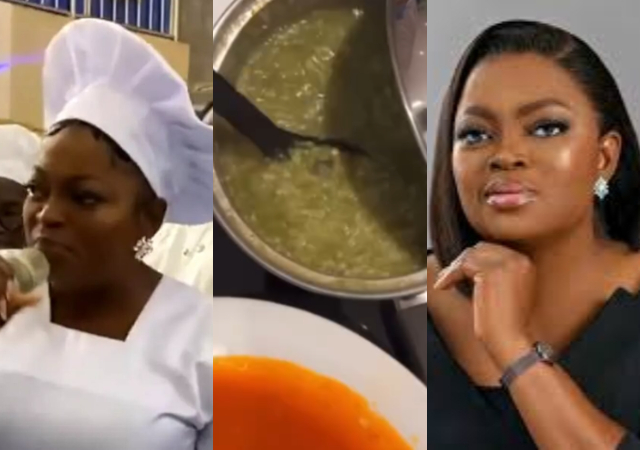Renowned Nollywood actress Funke Akindele found herself at the center of a culinary controversy on October 2, 2024. The star’s innocent act of sharing a video of her meal preparation ignited a fierce debate about religious dietary restrictions, personal freedom, and the role of social media in shaping public discourse.
As the sun set over Lagos, Nigeria’s bustling entertainment capital, Funke Akindele’s 15 million Instagram followers were treated to what seemed like a mundane glimpse into the actress’s everyday life. The video, posted at 7:30 PM local time, showed Akindele in her kitchen, carefully ladling okra soup onto a plate of fish and stew, with a generous serving of swallow visible nearby.
Little did she know that this simple act of meal preparation would soon spark a nationwide debate.
Within minutes of the video going live, a self-proclaimed religious purist took it upon themselves to criticize Akindele’s choice of meal. The commenter, whose identity remains anonymous, claimed that as a member of the Celestial Church, the actress should abstain from consuming okra.
This unsolicited dietary advice quickly caught Akindele’s attention. Known for her no-nonsense approach to social media interactions, the actress swiftly responded, stating unequivocally that she would block the troll and asserting her right to make her own food choices.
No one has the right to dictate what I eat,” Akindele wrote, her words carrying the weight of both personal conviction and celebrity influence.
As news of the exchange spread, Nigerians from all walks of life weighed in on the debate. The controversy quickly transcended its origins, evolving into a broader discussion about religious practices, personal freedom, and the role of social media in propagating and challenging cultural norms.
Cultural anthropologist Dr. Funmi Adewale offers insight into the deeper implications of the debate: “What we’re seeing here is a microcosm of the larger tensions in Nigerian society between traditional religious practices and modern, individualistic approaches to faith and lifestyle. Akindele’s response resonates with many young Nigerians who are seeking to define their own relationships with faith and tradition.”
As the controversy gained momentum, many of Akindele’s fans and fellow celebrities rallied to her defense. Instagram user @wendyempire04 wrote, “Agba prophet self Dey chop Okro soap die 

View this post on Instagram
This sentiment was echoed by many others who saw the criticism as an overreach of religious authority into personal matters.
The incident has also sparked discussions about the diversity of practices within religious communities. @Olamdotun, claiming insider knowledge, stated, “Don’t mind the alaimokan fellow. The ONLY thing Celestial Members are not permitted to eat is Pork. Every other thing, pls go on sọn. Eat as much as you like.”
This comment, among others, highlights the often complex and varied interpretations of religious dietary restrictions within faith communities.
As the debate raged on, social media experts began to analyze the broader implications of the incident. Digital culture analyst Chidi Nwoke comments:
What we’re witnessing is the immense power of celebrity influence in the digital age. A simple video of Funke Akindele preparing dinner has sparked a national conversation about religion, tradition, and personal autonomy. It’s a testament to both her influence as a public figure and the role of social media in shaping cultural dialogues.
As the dust settles on what has been dubbed “Okragate” by some witty social media users, questions arise about the future of religious practices in an increasingly connected and individualistic society.
Throughout the controversy, Funke Akindele has maintained a dignified silence, allowing her initial response to speak for itself. However, her stand against unsolicited religious dietary advice has positioned her as an unintentional champion for personal autonomy in matters of faith and lifestyle.
Entertainment industry insider Amina Okoro notes: “Whether she intended to or not, Funke Akindele has tapped into a sentiment that resonates with many young Nigerians. Her refusal to be shamed for her food choices could embolden others to question and challenge restrictive practices that may not align with their personal beliefs.”
What began as a simple dinner video has evolved into a national conversation about the intersection of faith, tradition, and personal choice in modern Nigeria. Funke Akindele’s okra soup controversy has done more than just entertain; it has held up a mirror to Nigerian society, reflecting the complex negotiations between tradition and modernity that many young Nigerians navigate daily.
As the nation continues to evolve, incidents like these serve as important touchstones, sparking crucial conversations about identity, faith, and the power of individual choice in an increasingly interconnected world. Whether this controversy fades into obscurity or marks the beginning of a larger cultural shift remains to be seen, but one thing is certain: in Nigeria, even a bowl of okra soup can be a catalyst for change.



